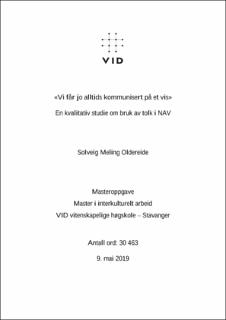| dc.contributor.author | Oldereide, Solveig Meling | |
| dc.coverage.spatial | Norge | en_US |
| dc.date.accessioned | 2020-08-18T13:59:15Z | |
| dc.date.available | 2020-08-18T13:59:15Z | |
| dc.date.issued | 2019-05 | |
| dc.identifier.uri | https://hdl.handle.net/11250/2672862 | |
| dc.description | Master's thesis MIKA. VID Specialized University, Stavanger, Mai 2019 | en_US |
| dc.description.abstract | Likeverdige tjenester er et grunnleggende prinsipp i Norge som reguleres både av internasjonale menneskerettigheter og nasjonale lovverk. Denne retten gir blant annet innbyggere rett til tolk dersom språk er en utfordring i møte med det offentlige. Likevel viser tidligere forskning at flere offentlige tjenester har et omfattende underforbruk av tolketjenester. Med dette som bakgrunn var formålet med denne studien å få kunnskap om hvilke vurderinger veilederne i NAV legger til grunn når de skal vurdere om de skal bestille inn språktolk til samtaler om økonomisk sosialhjelp. Oppgaven søker også å besvare om disse vurderingene ivaretar brukernes rett til likeverdige tjenester og medbestemmelse i egen sak.
Masteroppgaven bygger på en kvalitativ studie som tar utgangspunkt i individuelle intervjuer med åtte veiledere i NAV som veileder og saksbehandler etter Lov om sosiale tjenester i Arbeids- og velferdsetaten. Innhentet data er behandlet ved hjelp av tematisk analyse som samlet dataene i følgende fire hovedtema; (1) praktiske forhold på arbeidsplassen, (2) veilederens erfaringer, (3) Når er det behov for tolk? – veiledernes vurderinger og
(4) vurderinger etter Lov om sosiale tjenester i NAV. Resultatene presenteres og drøftes i lys av både kontekstuelle rammer og teori om kommunikasjon, tillitt og relasjonens betydning i arbeidet, maktbegrepet og tolking i interkulturelle kommunikasjonsprosesser.
Studien konkluderer med at det ikke i tilstrekkelig grad tilrettelegges for at brukerne skal kunne kommunisere på en fullverdig måte uavhengig av norsknivå og at deres rett til å delta på like vilkår dermed ikke kan anses oppfylt. Dette settes i sammenheng med manglende strukturelle rammer som opplæring og rutiner på NAV-kontorene som gjør at informantene ikke innehar kunnskapen som er nødvendig for å kunne benytte tolk som verktøy i arbeidet.
Equal services are a fundamental principle in Norway that is regulated by both international human rights and national legislation. Among other things, this right gives citizens the right to be offered an interpreter if language is a challenge in the face of public Norway. Nonetheless, studies show that several public services have extensive under-utilization of interpretation services. With this as a background, the purpose of this study was to gain knowledge about what assessments the supervisors in NAV make when it comes to assessing whether they should order language interpreters for discussions on economic social benefits. The task also seeks to answer whether these assessments safeguard the users' right to equal services and co-determination in their own case.
This Master's thesis is based on a qualitative study that is based on individual interviews with eight supervisors in NAV that counsel and work cases in accordance with the law on Social Services in the Norwegian Labor -and Welfare Service. The data obtained is processed using thematic analysis which compiles the data into the following four main themes; (1) practical workplace conditions, (2) supervisor's experience, (3) When is the need for an interpreter? - the supervisors' assessments and
(4) assessments according to the law on Social Services in NAV. The results are presented and discussed in light of both contextual frameworks and theory of communication, trust and the importance of the relationship in the work, the concept of power and interpretation in intercultural communication processes.
The study concludes that it is insufficiently arranged for users to be able to communicate in a fully-fledged manner regardless of the Norwegian Level and that their right to participate on equal terms can thus not be considered fulfilled. This is linked to a lack of structural frameworks such as training and routines at the NAV offices, which means that the informants do not possess the knowledge that is necessary to be able to use an interpreter to help with the communication. | en_US |
| dc.language.iso | nob | en_US |
| dc.subject | NAV | en_US |
| dc.subject | interkulturell kommunikasjon | en_US |
| dc.subject | sosialhjelp | en_US |
| dc.subject | tolking | en_US |
| dc.subject | intercultural communication | en_US |
| dc.title | «Vi får jo alltids kommunisert på et vis» : En kvalitativ studie om bruk av tolk i NAV | en_US |
| dc.type | Master thesis | en_US |
| dc.description.version | submittedVersion | en_US |
| dc.rights.holder | Forfatteren har opphavsrettighetene til rapporten.
Nedlasting for privat bruk er tillatt. | en_US |
| dc.subject.nsi | VDP::Samfunnsvitenskap: 200 | en_US |
| dc.source.pagenumber | 97 | en_US |
